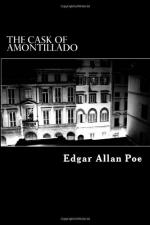|
This section contains 2,478 words (approx. 9 pages at 300 words per page) |

|
SOURCE: "The Bouquet of Poe's Amontillado," in South Atlantic Bulletin, Vol. XXXV, No. 2, March, 1970, pp. 35-40.
In the following essay, Henninger explains how the ending of Poe's story always elicits shock, despite the conclusion's obvious predictability.
"Nothing is more clear than that every plot, worth the name, must be elaborated to its dénouement before anything can be attempted with the pen. It is only with the dénouement constantly in view that we can give a plot its indispensable air of consequence, or causation, by making the incidents, and especially the tone at all points, tend to the development of the intention."
With these words of the second paragraph of his "Philosophy of Composition," Edgar Allan Poe illuminates an important part of his literary method; they help to explain the powerful effect of many of his stories. This effect, of course, was Poe's aim; as he says...
|
This section contains 2,478 words (approx. 9 pages at 300 words per page) |

|


